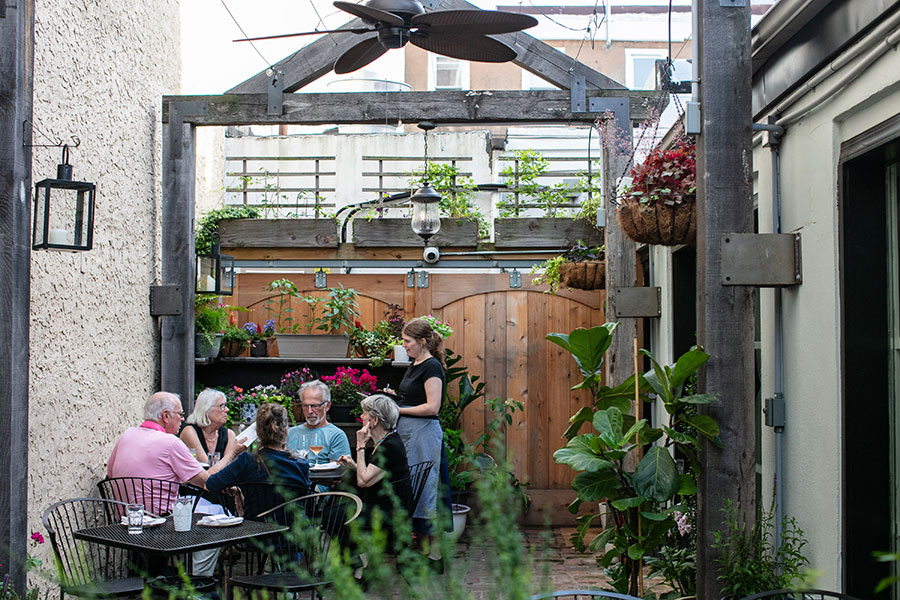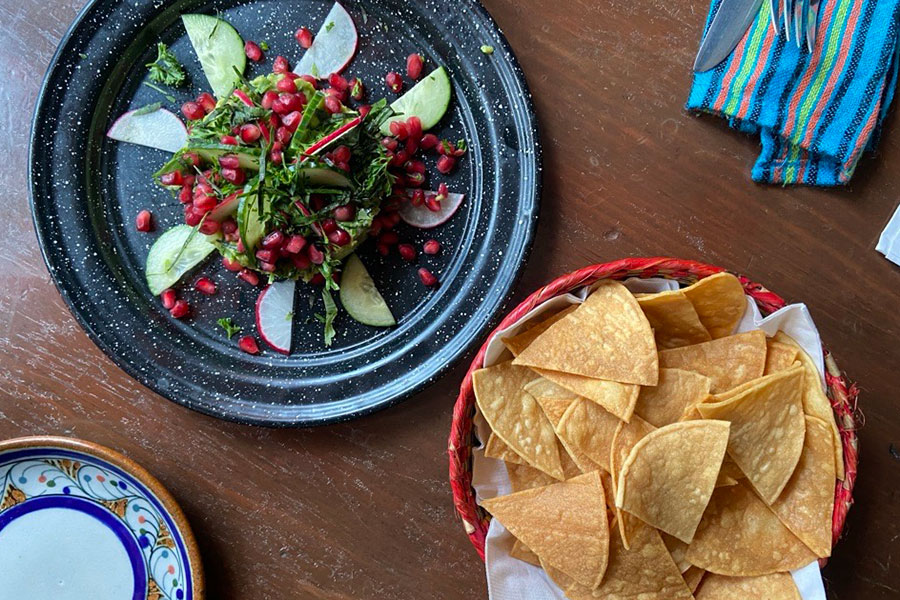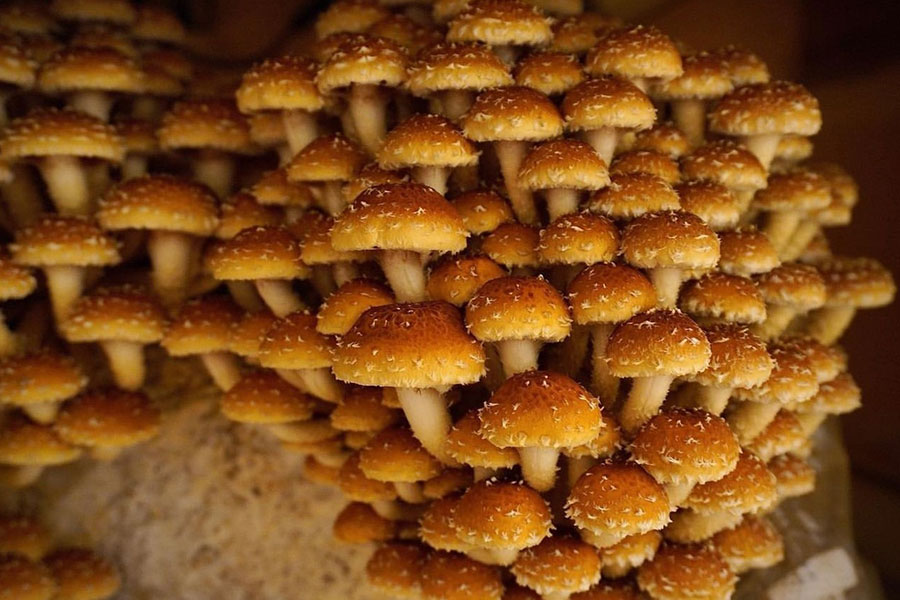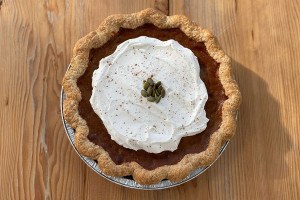From Garden to Table: A Guide to Philly Restaurants Growing Their Own Food
These urban eateries are growing ingredients on-site in everything from patio planters to hydroponics systems, bringing fresh flavors to diners’ plates.

Southwark’s patio is also a working herb garden. / Photograph by Neal Santos
Some are cultivating fragrant herbs in backyard gardens, using them to braise meats, punch up pasta dishes and season cemitas. Others are turning edible plants into syrups for botanical nonalcoholic cocktails, growing lemongrass for their spin on a cheesesteak, and plucking edible flowers to serve as drink garnishes. There’s even a steakhouse producing its own mushrooms in a hydroponics system in the kitchen.
Here are a handful of urban eateries growing some of their own ingredients and what to order when you visit. Just bear in mind that as seasons and menus change, not all of these items may be available at a given restaurant, but ask what they have growing — and they’ll likely be pleased to tell you.
Southwark, Queen Village
The patio at Southwark isn’t just a pretty place to sit — it’s also home to a working garden. The basil from the eatery’s patio planters, for example, adds a dose of freshness to the ricotta gnocchi, made with chanterelle mushrooms, capers and cherry tomatoes. And if you order the roasted lamb shoulder, it comes with meat seasoned in savory herbs grown right on the patio.
Garden herbs appear on Southwark’s drinks menu as well, where they’re used in a syrup for one of the bar’s signature nonalcoholic cocktails, Drifting Through the Blinds, and fused with citrus, honey, ginger, egg white and soda. The frothy, refreshing beverage is garnished with lemon balm — also from the garden — for a fragrant finish. 701 South 4th Street.
Ambra, Queen Village
While Ambra doesn’t have its own garden, it makes use of the ingredients growing on the patio at its sister restaurant, Southwark, just steps away — think of it as the culinary equivalent of borrowing, then never returning, your sibling’s clothes. They incorporate peppers and sorrel fresh from the garden in the Green Meadow Farm beef dish, which is served with a stuffed pepper, eggplant caponata (garnished with sorrel), pine-nut crumble and a cardamom jus.
Elsewhere on the menu, basil, oregano and summer savory herbs — also from Southwark’s garden — are used to season a number of dishes. 705 South 4th Street.

Guacamole and chips from Cantina La Martina. / Photograph by Kae Lani Palmisano
Cantina La Martina, Kensington
At chef Dionicio Jiménez’s Cantina La Martina, the fresh flavors on the menu are no coincidence — a number of ingredients come straight from the restaurant’s backyard. In the guacamole, for example, there’s fresh purslane (an edible succulent often likened to watercress or spinach in taste and also found in Cantina’s enchiladas), tarragon and papalo. The latter herb — which has butterfly-shaped leaves and a flavor that’s compared to cilantro and basil — can be found in the cemitas, too, as is custom in Pueblan cooking.
On the drinks menu, rosemary from the garden is the star ingredient in the Tequila Ocho Rosemary Paloma, which combines Tequila Ocho Blanco or Reposado, rosemary simple syrup, grapefruit, lime and Topo Chico. They also use garden-grown rosemary and thyme to braise meats. Meanwhile, other garden herbs that appear on the menu include mint — used in Cantina’s house-made salsas and as a garnish in drinks — and lavender, featured in the tres leches for dessert. 2800 D Street.

Mushrooms growing in an urban cultivator at Urban Farmer. / Photograph courtesy of Urban Farmer
Urban Farmer, Logan Square
The Logan Hotel’s steakhouse grows its own mushrooms right in the kitchen in its Urban Cultivator, a hydroponic system that can be used to cultivate herbs, vegetables and greens indoors. And if you ask for a tour, executive chef Sonny Ingui might just show you around.
Ingui pickles some of the fungi grown on-site and adds them to a few dishes, including the beef tenderloin tartare (along with fennel, cured egg yolk, and grilled bone marrow bread) and the striped bass, served with shimeji and shiitake mushrooms, crispy jasmine rice, spinach, leeks, a chili emulsion and nori furikake. They also appear in the pan-roasted pork belly — featuring shimeji mushrooms, Castle Valley Mill red grits, a maple glaze and dijonette dressing — plus the local mushroom side dish, tossed with caramelized onions and chives. Although Urban Farmer doesn’t grow enough to meet the demand for all of these dishes, Ingui says they’re supplemented with mushrooms he buys from the North Philly farm Mycopolitan as part of the restaurant’s efforts to focus on sourcing local ingredients.
On the topic of keeping it local, Urban Farmer is one of the city’s only restaurants to have its own in-house butcher shop. The steakhouse partners with seven ranches and farms that supply full livestock so that all butchering can be done on-site. There are three butchers on staff — plus Ingui and the team of chefs at Urban Farmer are trained — to keep the operation running smoothly. “We really try to preserve the integrity of the animal and use every bit of it,” Ingui says. The restaurant’s butcher program also includes dry aging, with those meats ending up on the charcuterie board. 1850 Benjamin Franklin Parkway.
Sor Ynez, West Kensington
At Sor Ynez, chef Alex Tellez tends to a garden on the restaurant’s patio, where there’s a plethora of herbs and produce growing, including radishes, serrano peppers, holy basil, Mexican oregano, sweet basil, papalo, horseradish and marigolds. The Mexican eatery is incorporating freshly grown purslane in its queso fresco dish (combined with corn, tomato and salsa macha) and also uses chives from the garden as a garnish for many plates. Edible flowers, again plucked from the garden, are used as drink garnishes. 1800 N. American Street.

Sahbyy Food’s lemongrass cheesesteak / Photograph by Roland Bui
Sahbyy Food, South Philly
While Sahbyy Food isn’t a restaurant, the Cambodian food vendor is well worth a mention for its lemongrass cheesesteak. The innovative menu item — a Best of Philly 2024 winner — has been a hit at FDR Park’s Southeast Asian Market since Sahbyy Food founder Pidor Yang began selling it there in 2022. Yang grows lemongrass, the cheesesteak’s signature ingredient, in the small backyard of her Willow Grove home, turning it into a paste to flavor the meat. The sandwich comes with either chicken or beef and is made with papaya salad, cheddar sauce, Sahbyy Food’s pepper chips and cilantro as a garnish, all served in a toasted hoagie roll.
Yang started out growing her lemongrass with stalks she picked up from the market, planting the base in a pot or her backyard to take root. “Whatever survives, I replant,” Yang previously told Foobooz. “What doesn’t survive gets tossed, and I start the process all over again.” She uses different parts of the lemongrass for the paste as the growing season progresses, since parts of the plant, like the leaves, take some time to appear. Yang likes using the leaves best, since they bring more flavor and color to the dish. 1500 Pattison Avenue.


